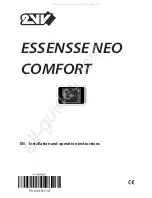
13
Terminal board connections
7
CMN
common for all inputs and outputs.
8
ELS
electric lock output (fed continuously)
12 Vdc
-
15 W
.
9-10
LC-CH2
Potential free contact for the activation of the courtesy light
(separate power supply
Vmax=30 Vac/dc: Imax=1A
) or the second radio
channel. Selection is carried out in the "
options
" menu.
11
CMN
common for all inputs and outputs.
12
LP
24 Vdc
25 W
output for warning lights intermittent activation (50%),
12,5 W
continuous activation.
13
LS
24 Vdc
3 W
output for an indicator light.
14
CMN
common for all inputs and outputs.
15
24 Vdc
controlled output, powering external loads
(1)
.
16
CMN
common for all inputs and outputs.
17
24 Vdc
output, powering external loads
(1)
.
18
TA
(NO contact) opening button input.
19
TC
(NO contact) closing button input.
20
TAL
(NO contact) limited opening button input.
21
TD
(NO contact) dynamic button input.
22
CMN
common for all inputs and outputs.
23
TB
(N.C./8.2 kΩ contact) stop button input (The opening of this contact
interrupts the cycle until a new movement command is given).
24
CP
(N.C./8.2 kΩ contact) safety edge input. Opening this contact will
provoke a travel direction inversion during the closing stage and during
the opening stage.
25
FS
(N.C./8.2 kΩ contact) The opening of this contact will block all move-
ment, until the obstruction has been removed and the pause time has
elapsed, due to the safety device cutting in, the door will then continue
moving in the closing direction (only with automatic reclosing enabled).
26
FI
(N.C./8.2 kΩ contact) safety and control devices in input (photocells
invert the travel direction when an obstruction is detected). Opening this
contact will provoke a travel direction inversion during closure due to the
cutting in of the safety device.
27
Outer conductor for radio receiver antenna.
28
Inner conductor for radio receiver antenna (if an external antenna is fitted
use a coaxial type cable
RG58
with an impedance of
50
Ω
).
29
CMN
common for the emergency buttons.
31
EMRG1
(NO) emergency manoeuvre input 1.
30
EMRG2
(NO) emergency manoeuvre input 2.
Note
(1)
The total of the 2 external device outputs must not exceed
10 W.
ALL UNUSED NC CONTACTS MUST BE JUMPED
and consequently the
security device test (
FI
,
FS
) must also be deactivated. If you want to activate
the
FI, FS
test both the transmission and receiver parts of the security devices
must be connected to the binding post marked "
CTRL 24 Vdc
".
If the test is active there will be a 1 second
delay between the command transmission
and movement of the gate/s.
• Switch on the power and make sure that the
indicator LEDs are in the following condition.
- L1
Power on
ON
- L2
Wrong battery connection
OFF
(2)
Indications on the display
at rest activated
- S1
Indicator for the blocking button
TB
(3)
TB
- S2
Indicator for the inverting photoelectric cells
FI
(3)
FI
- S3
Indicator for the stop photoelectric cells
FS
(3)
FS
- S4
Indicator for the safety edge
CP
(3)
CP
- S5
Indicator for the opening button
TA
TA
- S6
Indicator for the closing button
TC
TC
- S7
Indicator for the sequential command
TD
TD
- S8
Indicator for the limited opening button
TAL
TAL
Note
(2)
:
If this LED is "
ON
" disconnect the battery power cables
immediately.
Note
(3)
:
If the security device has not been activated the indications on
the display are at rest. Make sure that when the security device
is activated the status is inverted (black characters on a white
background).
If the
green power on LED "L1" doesn't light up
check the condition of the
fuses and the power cable connection at the transformer primary.
If
one or more of the safety indications "S1, S2, S3, S4" are active
(black
characters on a white background) check the contacts of the relative security
devices and check that the unused safety device contacts have been bridged.
The indications
"S5, S6, S7, S8"
change status on the display when the
relative command is activated, eg. pressing the button "
TA
" will change the
status from 'at rest' to 'active' (white characters on a black background).
B1
Signal buzzer "
via radio
" mode
F1
4A
blade fuse
(4)
(
24V
circuit protection)
F2
4A
blade fuse
(4)
(
24V
circuit protection during battery operation)
F3
10A
blade fuse
(4)
(motor power protection)
F4
10A
blade fuse
(4)
(motor protection during battery operation)
J1
Display orientation selection
J2
Serial connection CSER (not connected)
J3
Battery connection
J4
Battery charger slot
J5
Transformer secondary connection
J6
Emergency enable jumper
LCD1
LCD Display
M1
Transmitter code memory module
P1
Menu navigation button (
)
P2
Programming and confirm button (
PROG./OK
)
P3
Menu navigation button (
)
R1
Radio frequency module,
433 MHz
(
868 MHz
on request)
Note
(4)
:
These are
automotive
type blade fuses (max. voltage
58 V
)
Collegamenti scheda base
CC2X24
05-09-2015
DC0556
Description :
Product Code :
Date :
Drawing number :
P.J.Heath
CARDIN ELETTRONICA S.p.A
- 31020 San Vendemiano (TV) Italy - via Raffaello, 36 Tel: 0438/401818 Fax: 0438/401831
Draft :
All rights reserved. Unauthorised copying or use of the information contained in this document is punishable by law
CC2X24 SCHEDA BASE V1.00
(con display LCD + MULTI-DECODIFICA)
CS1422A DC0556
M1
B1
F2 4 A
TRANSFORMER
L1
29 30 31
F1 4 A
LCD1
P1
P2
P3
PROG/OK
J5
9
10
11
12
13
14
15
16
17
18
19
20
21
22
23
24
25
26
COLORE
COLOUR CODE
COLORATION
CABLAGGI CODE
DES CÂBLAGES
Bl Blu
Blue
Bleu
Gr Verde
Green
Vert
Gy Grigio
Grey
Gris
Yw Giallo
Yellow
Jaune
KABELFARBEN
COLORACIÓN
CABLEADOS
Bl Blau
Azul
Gr Grün
Verde
Gy Grau
Gris
Yw Gelb
Amarillo
Collegamento motori/encoder a 4 fili
Connecting motor/4-wire encoder
Branchement moteur/encodeur à 4 fils
Anschluss der Motor/Encoder mit 4 Drähten
Conexionado motores/encoder de 4 conductores
7
8
3
4
5
6
1
2
3
4
5
6
1
2
Yw
Gy
Gr
Bl
ENCODER 1
Yw
Gy
Gr
Bl
ENCODER 2
M1
M2
27
28
TD
TA
TC
24Vdc
TA
L
CMN
FI
TB
CP
FS
EMRG1
EMRG2
CMN
CMN
CTRL 24Vdc
CMN
LS
LP
CMN
LC/CH2
ELS 12Vdc
CMN
F4 10 A
J3
F3 10 A
BATTERY
CHARGER
J1
R1
J6
J2
J4
L2
PROGRAM
TB FI
FS
CP
TA TD
TC
TAL
00.000.007
CC2X24 V1.00
S5
S6
TB FI
FS CP
TA TD
TC TAL
00.000.007
CC2X24 V1.00
S1
S3
S7
S8
S2
S4














































